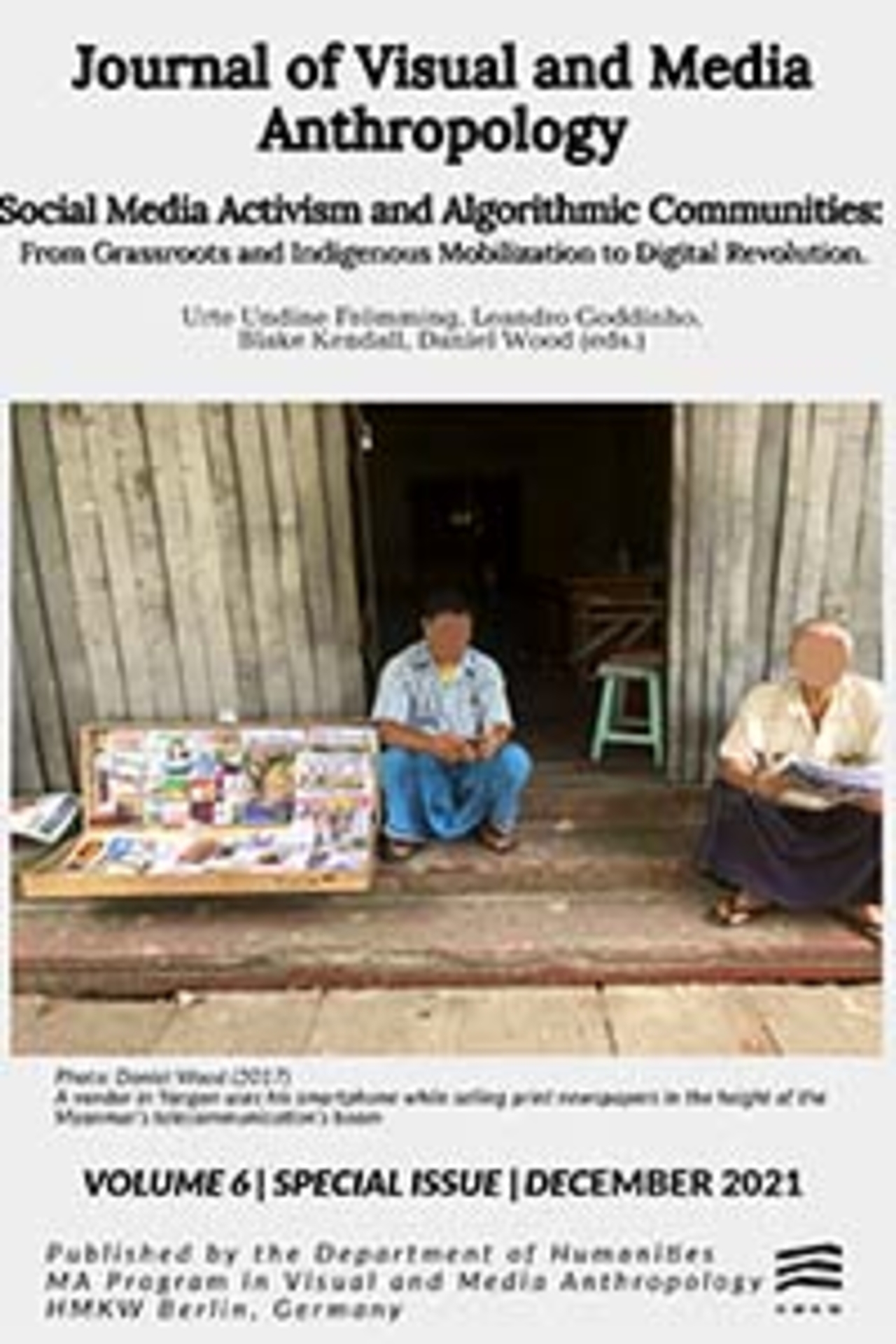Social Media Activism and Algorithmic Communities:
From Grassroots and Indigenous Mobilization to Digital Revolution.
Urte Undine Frömming, Leandro Goddinho, Blake Paul Kendall, Daniel Wood(eds.)
Social media activism; digital anthropology; social networks; networked desires; political anthropology; online research; algorithms; NGOs; indigenous activism
Social Media Activism and Networked Desires. Politics and Performance on Grassroots and Indigenous Networks.
The sixth volume of the Journal of Visual and Media Anthropology introduces several written articles and short films that explore themes of social media activism and desire, as mediated by digital platforms. This 2021 edition brought particular challenges for our contributors and editors, as two of the films intended for publication were censored. One film was censored for political reasons and taken down by the government of the filmmaker’s home country before it could be released. Another was flagged and taken down by Youtube’s algorithm for suspected disinformation.
The articles in this volume particularly focus on the growing power of large-scale, for-profit technology platforms. These opaque corporations and their oligarchs have now consolidated control over the digital space of the internet, and its material infrastructure.
Table of Contents
- Social Media Activism and Networked Desires. Politics and Performance on Grassroots and Indigenous Networks. An Introduction - Urte Undine Frömming, Daniel Wood
- Instagram and social noise: Where are the NGOs? - Chiara Beneventi
- Paradoxes of Digital Democracy in Brazil: Media coverage of “Marco Temporal” and the online activism of indigenous movements - Thaís Harumi Omine
- (Social) mediascapes Carved in Blood: Digital Performance and Myanmar’s Spring Revolution - Daniel Wood
- "white silence is..." - Rebecca Benoit
- Forbidden Desires - Maria Giovanna Cicciari
Chiara Beneventi applies a background in marketing and NGO social media management to some of the central debates in anthropology. Since 2019, Beneventi has worked at The Baobab Home, an NGO in Bagamoyo, Tanzania. As part of this job, she helps manage the organization’s social media accounts. In “Instagram and social noise: Where are the NGOs?” she uses her work experience and results of her ethnographic fieldwork in Tanzania to investigate the social media strategies of grassroots NGOs, alongside an analysis of the forms of participation produced by web 2.0 platforms, like Instag
Also applying a critical background in marketing to digital anthropology is “Paradoxes of Digital Democracy in Brazil: Media coverage of ‘Marco Temporal’ and the online activism of indigenous movements,” by Thaís Harumi Omine. Omineuses social media analysis to challenge the relationship between agency and subjectivity across media frames. Her analysis compares corporate sponsored public media and independent indigenous social media coverage of the ‘Marco Temporal’ legal process of expropriating indigenous land in Brazil. She finds that Brazil’s largest media producers align with the interest of capital, and particularly, agribusiness, while leveraging indigeneity as a visual trope to support the elite.
After working and researching with journalists in Myanmar for several years, Daniel Wood (an editor of this edition) writes “(Social)mediascapes Carved in Blood: Digital Performance and Myanmar’s Spring Revolution.” Following the 1st February military coup in Myanmar, countless crowds of everyday people swarmed streets across the country to protest the genocidal military’s rule, thus launching the Spring Revolution. Unlike previous Myanmar’s previous revolutions, most people had access to smartphone technology and affordable mobile internet to stream their experiences for the world to see. Yet, through surveillance, misinformation and unpredictable internet blackouts, the Myanmar military has particularly targeted the country’s journalists, media producers and digital activists. Wood highlights the risks that these digital activists assume as they use social media to reproduce and perform the anti-coup movement, while documenting military war crimes from heavily surveilled and persecuted digital space.
Rebecca Benoit's film interrogates the phrase, “white silence is violence,” which spread rapidly around off and online protests. Benoit raises questions about the value of the phrase, and why it took up such meaning amidst the protest movement. Combining online research with focused interviews, Benoit structures a polyvocal conversation around the racialized experiences of people in the United States, white silence, and the participation of white allies who may remain complicit in the very systems they use anti-racist language to distance themselves from.
Sharing a technique of machinima filmmaking, Maria Giovanna Cicciari uses digital recordings and interviews to structure conversations around how users simulate forbidden desires within the video game world of the Sims. Less of a social network, and more of a hyper-individualized simulated digital reality, the Sims promotes individual gameplay around pre-programmed landscapes and experiences. Cicciari investigates how women modify Sims gameplay to express unfulfilled desire related to experiences with fertility, childrearing, and domestic violence. Engaging with the politics and anthropology of gender, the film dives deeply into how virtual worlds can become a platform for the expression of desires repressed by the physical world.





